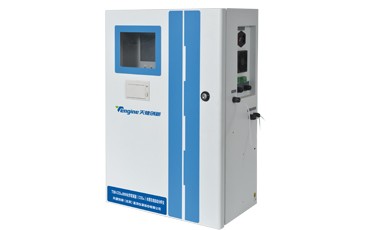Online COD analyzer
-
Category:Industrial automation instruments
- Click count:
- Release date:2024/07/09
- Online inquiry

● The inlet and outlet of sewage and water treatment plants
● Pollutant outlets of various enterprises
Principle:
Water samples, potassium dichromate digestion solution, silver sulfate solution (adding silver sulfate as a catalyst can more effectively oxidize linear fatty compounds), and a mixture of concentrated sulfuric acid are heated to 165 ℃. The color of the organic matter in the dichromate ion oxidation solution will change. The analyzer detects this color change and converts this change into a COD value to output. The amount of dichromate ions consumed is equivalent to the amount of oxidizable organic matter. The main interfering substances during the measurement process are chloride ions or chlorides, which can be removed by adding mercury sulfate to the water sample.
characteristic:
● Adopting the method specified in the national standard (GB11914-89), the dichromate method has high accuracy, good stability, and good correlation with manual analysis;
● Unique structural design with lower failure rate, lower maintenance, lower reagent consumption, and higher cost-effectiveness; This instrument has strong resistance to chloride ion interference and can directly detect water samples with a chloride ion content of up to 10000mg/L;
● Unique valve components and flexible switching of multiple channels make the equipment easy to maintain and have a long lifespan;
● The precise optical system enables precise measurement of reagents, overcoming quantitative errors caused by wear of peristaltic pumps and pump tubes, and achieving precise quantification of trace reagents, greatly reducing reagent usage;
● A closed high-temperature and high-pressure digestion system not only accelerates the reaction process, but also overcomes the corrosion of equipment caused by corrosive gas volatilization in open systems of other similar equipment;
● Power outage data protection to ensure that instrument system data is not damaged and data records are not lost;
● Multiple signal output interfaces to meet various access needs;
● It has an over limit alarm function and can be used in conjunction with a sampler to achieve over limit sample retention;
● With network functionality, data sharing and remote control can be achieved through a network platform;
● Equipped with a micro printer for permanent data storage.
Performance indicators:
Measurement performance
Measurement range: 0-200mg/L; 0 ~ 600mg/L ; 0~1200mg/L;
Can be expanded to 5000mg/L according to user requirements
Measurement accuracy: ± 3mg/L (COD < 30mg/L); ±10%(30mg/L≤COD<100mg/L); ±8%(COD ≥ 100mg/L)
Detection limit: 3mg/L
Zero drift: ± 5mg/L
Range drift: ± 5% F.S
Measurement cycle: The minimum measurement cycle is 25 minutes
Calibration: Equipped with online automatic calibration function
Automatic cleaning: The instrument automatically cleans the pipeline after each measurement
Reagent consumption: 0.65-2.6 milliliters/time/reagent
Data storage: 500000 historical data storage (full data records over ten years)
Data protection: No data loss due to abnormal alarms and power outages
Display: Touch screen display and command input
Output
Interface output: Standard configuration: RS232/RS485, dual 4-20mA;
Optional: Wireless Internet of Things interface, linkage control interface
Power supply
AC power supply: 220 ± 22VAC, 50 ± 2.5Hz
Instrument power: daily average 50W; <300W at peak
physical property
Size: 420 x 600 x 250mm
Environmental performance
Environmental requirements: 0-40 ℃, relative humidity ≤ 90%, no condensation or condensation
External water sample: pressure: -10~+2KPa; Flow rate: -1.0~0.5m/s; Temperature: 5-40 ℃
Previous article:PH ORP meter
Next article:KEF type electromagnetic flowmeter

